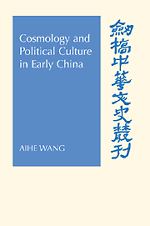Book contents
- Frontmatter
- Contents
- List of Illustrations
- List of Tables
- Acknowledgments
- 1 Introduction
- 2 Sifang and the Center: The Cosmology of the Ruling Clan
- 3 Wuxing: Cosmology in Historical Transition
- 4 Moralizing Cosmology and Transforming Imperial Sovereignty
- 5 Contesting Emperorship: The Center of the Cosmos and Pivot of Power
- Conclusion: Cosmology and Power Reconsidered
- List of Abbreviations
- Works Cited
- Index
Conclusion: Cosmology and Power Reconsidered
Published online by Cambridge University Press: 16 September 2009
- Frontmatter
- Contents
- List of Illustrations
- List of Tables
- Acknowledgments
- 1 Introduction
- 2 Sifang and the Center: The Cosmology of the Ruling Clan
- 3 Wuxing: Cosmology in Historical Transition
- 4 Moralizing Cosmology and Transforming Imperial Sovereignty
- 5 Contesting Emperorship: The Center of the Cosmos and Pivot of Power
- Conclusion: Cosmology and Power Reconsidered
- List of Abbreviations
- Works Cited
- Index
Summary
Throughout Chinese history, the Bronze Age has been seen as the golden age of antiquity, the Han Empire held as the ideal model of imperial order, and the cosmology that emerged during the transition between these two ages acclaimed as the essence of Chinese civilization and the deep structure of the “Chinese mind.” This historical study of early China's cosmology demystifies this vision of antiquity, unpacks the imperial model, and debunks the idea of an essential Chinese cultural structure. In doing so, it rethinks culture, power, and the Chinese tradition.
The Mutual Construction of Cosmology and Power
One major theme throughout this study has been that cosmology and political power in early China were mutually constructive. By mutually constructive, I mean that there was no cosmology prior to and independent of its sociopolitical reality, existing as a pure “celestial archetype” or as a deep structure of the Chinese mind that social and political reality imitated or repeated. Cosmology in early China was constructed, and its meaning and structure repeatedly defined, through the power contests of the time. Similarly, there was no given social political structure, independent of and ontologically prior to the cosmology, for which cosmology served as merely a reflection, legitimization, or justification.
- Type
- Chapter
- Information
- Cosmology and Political Culture in Early China , pp. 210 - 216Publisher: Cambridge University PressPrint publication year: 2000



